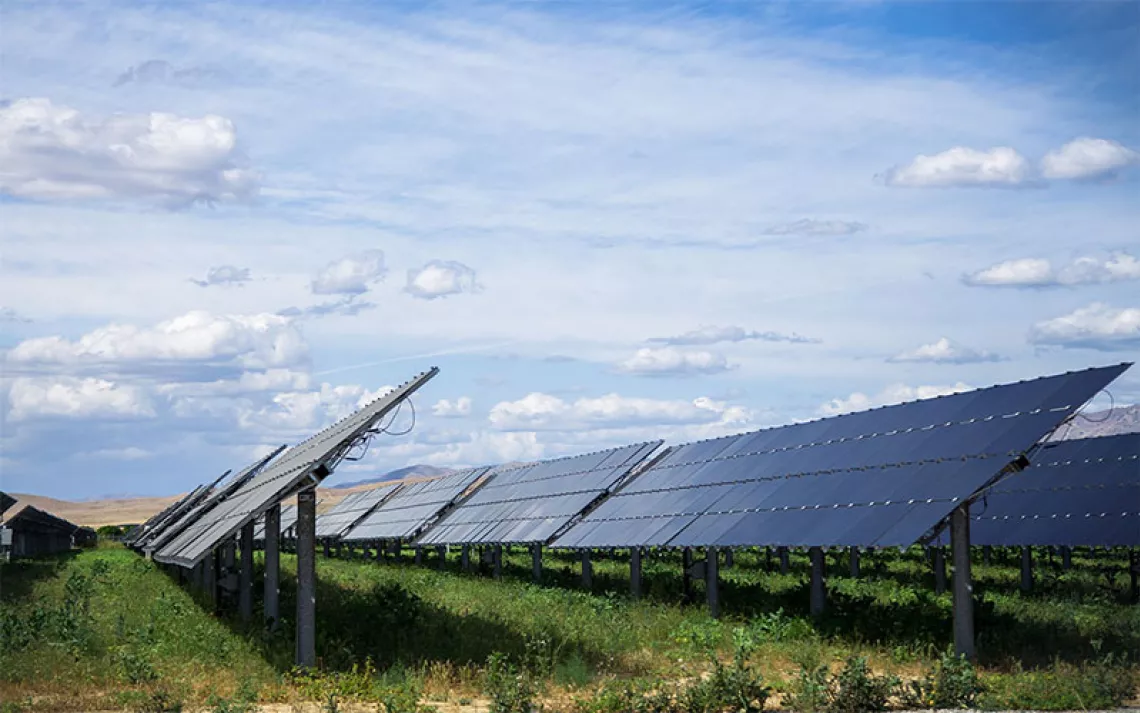Kim Stanley Robinson On His New Book, Climate Change, and Why He’s Still Optimistic
"New York 2140" is set in a Manhattan flooded by rising sea levels. Its characters have had it with global capitalism.

New York 2140 by Kim Stanley Robinson, Orbit (March 14, 2017)
Perhaps best known for his Mars Trilogy, in which he chronicled the terraforming of the Red Planet, author Kim Stanley Robinson is renowned for the environmental savvy he brings to his science fiction.
With his latest book New York 2140, he stays close to home in time and space, presenting a near-future Manhattan adapting to climate change, flooded by a 50-foot rise in sea level and turned into a canal-filled New World version of Venice. The action centers around the residents of a single, semi-submerged apartment building in Madison Square.
Robinson′s good-hearted novel sometimes plays like a romantic comedy, but there′s a serious message about capitalism packed into the utopian tale. After another natural disaster strikes, New Yorkers contemplate ways to challenge the global economy, using techniques Robinson believes may actually be viable in the here-and-now.
Reached by phone at his home in Davis, California, Robinson discussed the genesis of the new novel.
—Michael Berry
The title of your new book, New York 2140, tells us where and when the action takes place. How did you decide on the setting and the time?
I went to my editor, Tim Holman, and said, “I want to write about global finance.” He said, “Oh God, never say that again. Horrible idea.” And I said, “But I want to do it.” So he thought for a while and said, “Well, remember that drowned Manhattan from your [science fiction novel] 2312? If you want to do finance, New York is the logical place to do it. Could you put the book in that drowned Manhattan?”
In terms of picking the time, it was just a matter of making it far enough off that the sea level rise could be justified but close enough that we still have the current set of problems.
What was the research and world-building process for this one like?
On global finance, I had a huge amount of help from the “Rethinking Capitalism Initiative,” a past project at U.C. Santa Cruz′s Institute for Humanities Research. UCSC professor Robert Meister gathered a crew of people from anthropology, sociology, and political economy. While I was meeting with these people, they gave me all kinds of analytical tools, concepts, books, ideas. I felt like I was on a cutting edge of current political economy, with an economics primer that was pretty sophisticated.
As for New York, I’m a Californian, and it was intimidating at first. I felt like I was more comfortable writing about Mars than I was writing about New York.
What I discovered is that it’s a very charismatic, very exciting city, and it’s kind of inclusive. There’s no one setting up barriers to say, “Well, you’re not a New Yorker, so you don’t get to talk about New York.” I enjoyed my visits enormously and went to odd places that were driven by my plot, especially the old Met Life Building.
What source did you base your 50-foot sea level rise on?
It comes out of a couple of different things. There’s the theoretical prospect that if all the ice on the planet were melted, sea level would rise somewhere between 200 and 250 feet. That’s not going to happen any time soon, because Antarctica is such a massive and locked-up amount of ice. But the possibility of 50 feet is there.
James Hansen and 16 co-authors wrote a paper saying that with just a one-degree Celsius temperature rise you can get meters′ worth of sea-level rise. They explained that some of the ice in Antarctica is really unstable, and when the ocean warms it, that ice can be dislodged into the ocean. That gave me my scientific justification. We don’t really know how fast it could happen.
To tell you the truth, I just wanted a 50-foot sea level rise because that’s what gets lower Manhattan to canal status.
What were the challenges in writing about economics and finance?
There’s one chapter where a day trader named Franklin Garr explains his Intertidal Property Pricing Index, and that five- or six-page passage took me about two months of research and thinking and writing to get right. So it was intense.
I’m an English major. I don’t have an economics background. I’ve been reading intensively in economics for about 10 years, but bringing it to bear in a coherent and entertaining way is a big challenge.
Do you really think that global capitalism can be replaced?
Oh, yes, I do. I think that it’s an illusion that it is locked in concrete.
It’s a system that is wrecking the planet and people’s lives, and it’s unsustainable in the pure sense of physics. Since it can’t go on forever, it’s going to change at some point. We might as well change it sooner, so that it doesn’t create as much damage.
The global nature of capitalism is actually an advantage, because you could change those global rules and suddenly a system that’s destructive right now could become quite productive and positive. We need the global solutions at the level of the World Trade Organization, the World Bank, and the big treaties. That’s where the book tries to suggest that we need to change the rules.
Do you feel local action is relevant?
It’s important to have local actions of all kinds, including personal life and habits. All actions are relevant now and can force change in the aggregate. It’s an “all hands on deck” moment, but I think local actions won’t be enough on their own. We need sustainable and just policies globally.
In what ways might your vision of the future in New York 2140 have changed if you had taken into account the Trump presidency?
When New York 2140 was written, I would have said [a Trump presidency] was impossible. I wrote the book understanding that it would be normal politics and normal finance, which is already bad enough. Now there’s a sense in which we’re in a different space.
I guess I’d like to say that more books need to be written, but New York 2140 is perfect for the moment. Things have changed, but they haven’t changed in terms of us living in a global capitalist system that’s wrecking the planet. The book is still relevant. It made some assumptions that are already untrue, but that’s what happens in science fiction.
So how do people maintain optimism in the face of the next four years?
By regarding optimism as a club to beat political opponents with and remembering that it’s not naïve and it’s not stupid to be optimistic. It’s having faith in the larger resilience of the system of democracy over a momentary aberration. This might be the last desperate gasp of a losing demographic of racists, a kind of a coalition of bad will, which will never be able to win again and will now crash and burn.
You will the optimism as a political weapon to keep yourself active. It’s not easy, and it’s definitely not automatic. It’s more like, “Goddammit! I’m gonna stay optimistic!”
 The Magazine of The Sierra Club
The Magazine of The Sierra Club



